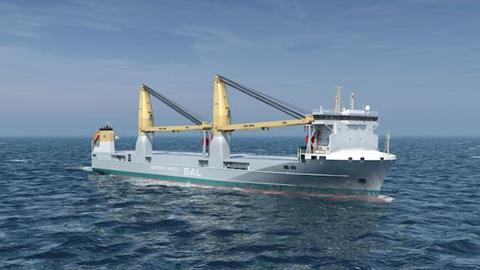SAL Heavy Lift has shed some light on its newbuilding programme, jointly initiated with its partner Jumbo Shipping. Named the Orca-class, the first two ships will be exclusively involved in the transport of offshore wind turbine components in a long-term commitment with Siemens Gamesa Renewable Energy.

HLPFI previously reported that SAL placed an order for up to six 14,600 dwt multipurpose heavy lift vessels with China’s Wuhu Shipyard. The contracts cover four newbuildings, plus two options.
The ships will start to be delivered mid-year 2024. While the first two will serve Siemens Gamesa, the third and fourth vessels will enter the premium heavy lift shipping market to serve clients of the Jumbo-SAL-Alliance in the first half of 2025.
“The Orca vessels are setting new standards in global heavy lift shipping. They represent the new benchmark both in terms of their technical capabilities and modern climate-friendly propulsion systems,” said Dr. Martin Harren, owner and ceo of SAL Heavy Lift and the Harren Group. “The ships will be the most efficient vessels in their class with consumption and emission figures far superior to any existing heavy lift vessel today. As a signatory to the ‘Call to Action for Shipping Decarbonization’, our group has committed to the decarbonisation of shipping activities by 2050. I am proud that this newbuilding order shows how we are keeping our promise for significant, concrete action.”
Jumbo Shipping’s owner Michael Kahn said: “One can say that these ships mark the beginning of a new era for the Jumbo-SAL-Alliance – no exaggeration. I would like to take this opportunity to thank the newbuilding design team at SAL for their great cooperation. I am very impressed with their passion and technical expertise. The ships will help bring us even closer together.”
The vessels measure 149.9 m x 27.2 m and provide a capacity of 14,600 dwt. The vessels have a box-shaped single cargo hold. The hatch covers have a capacity of 10 tonne per sq m. If they are not utilised, the ships will be suitable for over-height cargo in the hold.
Thomas Mortensen, head of transport project execution, offshore at Siemens Gamesa Renewable Energy, added: “We are especially impressed with the flexibility these new vessels represent. Our business is complex, challenged by rapid globalisation as well as the increasing size and weight of our turbine components. The need for flexibility is higher than ever, and the Orcas meet several of our anticipated medium- to long-term transportation challenges.”
Vessel capabilities
Ice class notation 1A, a Polar Code certification and the reduced design temperature of the hull and equipment allow the ships to safely operate in cold conditions, while two 800-tonne Liebherr cranes have been designed specifically for the ship type.
“Despite extremely high crane pedestals of more than 11 m, the overall crane height and thereby the vessel’s air draft remains at just about 38 m. This makes it possible for the vessel to pass Kiel Canal and enter strategically important ports worldwide,” explained Sebastian Westphal, chief technical officer at SAL Heavy Lift. “The fully electric cranes are perfect for the vessel’s intelligent energy management and recovery system. This is based on a battery storage system that can be used together with conventional gensets in hybrid mode, or in combination with the vessel’s shore power connection for fully electric port operations.”
In addition to the optimised hull design, the Orca vessels will have an innovative propulsion system consisting of compact and efficient main engines and a diesel-electric booster function, said SAL and Jumbo.
At a service speed of 15 knots, the vessels will consume significantly less than 20 tonnes of fuel oil per day – similar to smaller-sized and geared multipurpose vessels. Alternatively, the vessels will be able to trade at a slower, more efficientspeed of 10 knots at 6 tonnes, while still being able to reach a maximum speed of 18.5 knots for urgent deliveries.
The vessels are equipped with dual-fuel engines, which means that they can use methanol as an alternative fuel. If green methanol becomes available in key ports as anticipated towards the end of the decade, the Jumbo-SAL-Alliance will be able to offer their customers carbon-neutral transport solutions.
















